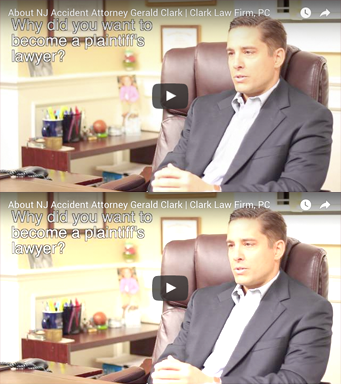Frequently Asked Questions about New Jersey Automobile, Workplace and Negligence Lawsuits
1. How soon after an Accident or Injury should I get a Lawyer?
As soon as possible. As soon as the insurance company finds out about the incident, it will take steps to defend the case and work to get you as little as possible or nothing. Clark Law Firm representatives are available to assist you 24 hours a day. Injury case consultations are always free of charge. When you are injured, whether it’s an auto accident, fall down, construction accident, nursing home neglect case, defective product or other injury matter, insurance companies immediately engage in investigation to prevent you from winning a recovery. The longer you wait to retain a lawyer, the more time the insurance company will have to prepare a defense against your claim without the legal protection of an experienced accident law firm. There are also important time limitation to bring a claim or provide notice of a claim. If you do not meet those requirements, you could be forever barred from bringing one later.
2. What should I do when an insurance company calls after an injury?
Do not take their call. Instead, immediately contact an experienced accident case law firm to advise you and protect your rights. Often the insurance company behind the one who caused your injury will contact you to take a statement which they will then use against you later. The insurance company investigator will look to gather information from you to prevent you from obtaining a recovery later in court. Do not give a statement to an adverse insurance company. To protect yourself, call the best New Jersey accident case lawyers. Insurance investigators seem sympathetic and helpful and often discourage you from contacting an attorney, much less the top personal injury lawyers. Do not be misled: these are trained professionals, not your friend. They are not there to help you; they are there to limit or eliminate what you can get.
3. The person from the insurance company was so polite and sympathetic and told me they won’t pay me any more money if I get a lawyer…and the lawyer will actually cost me money. Is this true? Why do I need a lawyer?
Never forget that the insurance company’s person is working only for the insurance company and it is their job to see to it you get little or no recovery. If making that happen means being nice to you, they will be. The goal of an insurance company is to sell policies to people and businesses to afford coverage and collect premiums while never having to pay a cent for either defense or indemnification. Such maneuvering follows the “unholy mantra” of the insurance industry, as characterized by Judge Baime, that “we collect premiums; we do not pay claims.” Owens-Illinois, Inc. v. United Ins. Co., 264 N. J. Super. 460, 491 (App. Div. 1993), aff’d in part, rev ‘d and rem’d in part, 138 N.J. 437 (1994). Don’t be fooled and don’t fall into that trap- hire an experienced accident lawyer without delay. What’s good for the insurance company is almost always bad for you. Without an attorney, the insurance will try to settle with you quickly and cheaply.
4. How much will the attorney’s fees cost me?
Most accident and injury cases at Clark Law Firm are taken on a contingency basis. This means you are not required to pay any attorney fee unless we recover for you. A contingency fee is a percentage of the money we recover for you. This way, all accident victims can hire an experienced attorney to battle the insurance company lawyers and doctors. While the percentage can vary depending on the circumstances of the case and any fee applications made to the Court, the fee is usually about one-third of the net recovery.
5. Can I go to any Doctor I want or does my insurance company get to pick?
In auto accident cases, your personal injury protection coverage (“PIP”) insurance company has no right to choose your treating health care provider or doctor. You can go to any doctor you want. In other kinds of injuries, like workplace injury workers compensation cases, you may have to choose a doctor who is on your list of preferred providers or primary care physicians depending on the type of health insurance you have. Clark Law Firm attorneys and staff can review this with you and help you to decide.
6. Will the other person’s insurance company pay my medical bills?
It is highly unlikely they will as the case or claim is on-going. However, “out of pocket” medical bills may be factored into the value of your case, a final evaluation, and ultimately settlement of your case. In auto crash cases in New Jersey, ordinarily you have to go through your own insurance company for medical bills, even if the crash was not your fault. This is called a “no-fault” system; medical bills are paid by your own carrier, regardless of fault.
7. Will the other person’s insurance company pay my lost wages?
Again, probably not as the case is going on. However, your lost wages, past, and future, can be recovered as part of your harms and losses that you can claim at trial. In an automobile accident case, you may have what is called “income continuation benefits” under your own insurance policy. You can make an application for these benefits to make up part of your lost wages, but the amount is usually small, about $5000.
8. Will the other person’s insurance company pay me an “advance” for my injuries and then reach a final settlement later?
No. This pretty much never happens in New Jersey. If the “at-fault” insurance company pays at all, it will usually be a lump sum at the end of the case and it is usually final. Workers compensation cases are different. There you can get temporary wage and medical benefits, before the end of the case when you would qualify for a permanency award.
9. What if it turns out my injuries are worse than I expect many years from now?
Usually personal injury settlements are final at which time you will be required to sign a full general “Release” of all claims. Similarly, jury awards are final (unless there is an appeal). That is why it is so important for juries to award full and fair compensation taking into account how the injuries will probably progress into the future. If you get worse years down the road, you cannot come back to court and get a new jury. Workers compensation claims are different. In those cases you may qualify for a “reopener” if your injuries get worse or you need more treatment. You should consult with the best New Jersey accident law firm for your particular situation.
10. How much income tax do I have to pay from my Personal Injury settlement or jury award?
It is generally understood that compensation for pain and suffering in a personal injury case is considered compensation, not a gain, and therefore awards in personal injury cases should almost always be tax-free. However, you should consult with a tax professional on this to make a determination in your particular situation.
11. How long will my Personal Injury case last, from beginning to end?
In New Jersey it is usually about 2-4 years from the time the suit is filed until it ends. However, this is just a general estimate. The length of the case can vary greatly based on a number of factors including the nature and extent of your injuries and required medical treatment, the nature and circumstances of your case, the number of parties involved, the court the case is filed in, the number of judges available to hear cases, motion practice, appeals and a multitude of other factors.
12. If a lawsuit is filed, does this mean I am going to trial?
No. Roughly 80-90% of lawsuits never go to trial. They are either settled or thrown out of court on summary judgment or dismissal motions.
13. What if I’m hurt on the job? Can I sue for “pain and suffering”?
This depends. If you only have a negligence claim against your employer, you can only bring a workers compensation case, not a lawsuit case. For the workers compensation case, you want to contact an experienced workers compensation attorney associated with the Clark Law Firm. In a workers compensation case you cannot make a claim for pain and suffering. You can only make claims for wages, medical benefits, and permanent disability. Speak to the experienced NJ workplace injury lawyers at Clark Law Firm for a free consultation on this. If you are injured on the job due to the fault of a Third Party, you can bring a negligence claim for that.
14. How much is my case worth?
The value of a case differs from case to case and client to client. For a more detailed explanation of how the value of an accident case is determined, visit our “What’s My Accident Case Worth?” page.
15. What factors are considered in putting a value on my case?
The value of your case is dependent upon a number of factors, including:
- How the accident happened;
- The degree of fault, apportioned between the participants in the accident;
- The nature, degree, and severity of injuries;
- When, where and how faithfully you obtain medical care;
- Your lifestyle, interests, hobbies, and activities before and after the accident;
- Your ability to work before and after the accident;
- Your medical history: any prior problems to the same areas of the body;
- Your litigation history: any prior personal injury claims;
- Your work history;
- Your life expectancy
- How good your lawyer is- always try to find the best accident case lawyer or the top personal injury lawyers in New Jersey and;
- A multitude of other factors, the list could be endless.
16. What are “liens” or “subrogation liens/”
In the personal injury accident case context, “liens” or “subrogation liens” are a charge, hold or claim against your personal injury settlement to “payback” monies that have been paid to you in connection with your accident. So for example, in New Jersey, if you had an accident at work and received benefits under workers compensation such as for temporary lost wages or medical treatment, and you settle a related personal injury case, the workers compensation insurance company will be entitled to a return of about 2/3 of what they paid out on your claim. This is called a “workers compensation lien.” Similarly, if your received medical benefits from the federal Medicare program for the treatment of injuries sustained in an accident, and you settled a related accident lawsuit, Medicare will have a lien on that. That is called a “Medicare lien.” Consult with the experienced trial lawyers at Clark Law Firm for more information.


